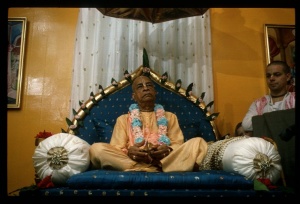CC Madhya 20.328: Difference between revisions
No edit summary |
(Vanibot #0054 edit - transform synonyms into clickable links, which search similar occurrences) |
||
| Line 17: | Line 17: | ||
<div class="synonyms"> | <div class="synonyms"> | ||
''indra-sāvarṇye'' | ''[//vanipedia.org/wiki/Special:VaniSearch?s=indra&tab=syno_o&ds=1 indra]-[//vanipedia.org/wiki/Special:VaniSearch?s=sāvarṇye&tab=syno_o&ds=1 sāvarṇye]'' — in the Indra-sāvarṇya-manvantara; ''[//vanipedia.org/wiki/Special:VaniSearch?s=bṛhadbhānu&tab=syno_o&ds=1 bṛhadbhānu]'' — the ''avatāra'' named Bṛhadbhānu; ''[//vanipedia.org/wiki/Special:VaniSearch?s=abhidhāna&tab=syno_o&ds=1 abhidhāna]'' — named; ''[//vanipedia.org/wiki/Special:VaniSearch?s=ei&tab=syno_o&ds=1 ei] [//vanipedia.org/wiki/Special:VaniSearch?s=caudda&tab=syno_o&ds=1 caudda] [//vanipedia.org/wiki/Special:VaniSearch?s=manvantare&tab=syno_o&ds=1 manvantare]'' — in the fourteen manvantaras; ''[//vanipedia.org/wiki/Special:VaniSearch?s=caudda&tab=syno_o&ds=1 caudda]'' — fourteen; ''[//vanipedia.org/wiki/Special:VaniSearch?s=avatāra&tab=syno_o&ds=1 avatāra]'' — of the incarnations; ''[//vanipedia.org/wiki/Special:VaniSearch?s=nāma&tab=syno_o&ds=1 nāma]'' — different names. | ||
</div> | </div> | ||
Latest revision as of 22:43, 19 February 2024

A.C. Bhaktivedanta Swami Prabhupada
TEXT 328
- indra-sāvarṇye ‘bṛhadbhānu’ abhidhāna
- ei caudda manvantare caudda ‘avatāra’ nāma
SYNONYMS
indra-sāvarṇye — in the Indra-sāvarṇya-manvantara; bṛhadbhānu — the avatāra named Bṛhadbhānu; abhidhāna — named; ei caudda manvantare — in the fourteen manvantaras; caudda — fourteen; avatāra — of the incarnations; nāma — different names.
TRANSLATION
“In the Indra-sāvarṇya-manvantara, the avatāra is named Bṛhadbhānu. These are the names of the fourteen avatāras in the fourteen manvantaras.
PURPORT
Śrīla Bhaktisiddhānta Sarasvatī Ṭhākura, in his Anubhāṣya, gives a list of Manus and their fathers’ names: (1) Svāyambhuva Manu, the son of Lord Brahmā; (2) Svārociṣa, the son of Svarocis, or Agni, the predominating deity of fire; (3) Uttama, the son of King Priyavrata; (4) Tāmasa, the brother of Uttama; (5) Raivata, the twin brother of Tāmasa; (6) Cākṣuṣa, the son of the demigod Cakṣus; (7) Vaivasvata, the son of Vivasvān, the sun-god (whose name is mentioned in the Bhagavad-gītā [4.1]); (8) Sāvarṇi, a son born to the sun-god and his wife Chāyā; (9) Dakṣa-sāvarṇi, the son of the demigod Varuṇa; (10) Brahma-sāvarṇi, the son of Upaśloka; (11-14) Rudra-sāvarṇi, Dharma-sāvarṇi, Deva-sāvarṇi and Indra-sāvarṇi, the sons of Rudra, Ruci, Satyasahā and Bhūti respectively.